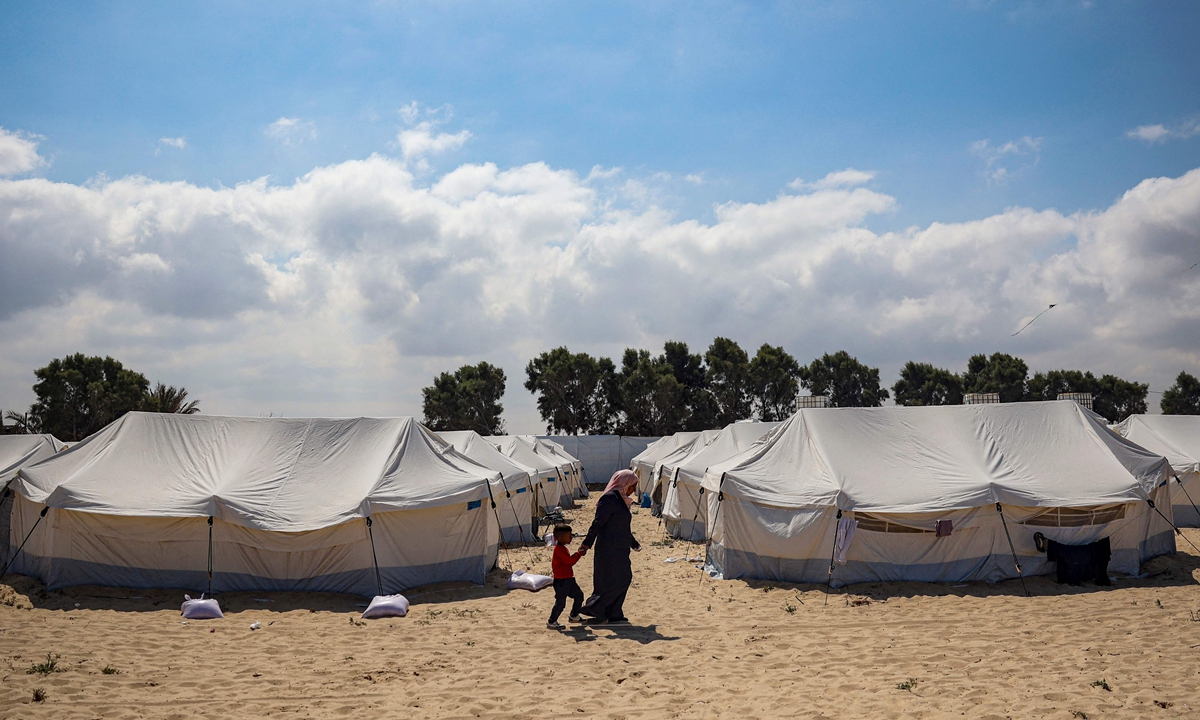Editor’s Note:
After seven months of conflict in Gaza, a cease-fire still seems distant. Meanwhile, the Palestine-Israel conflict is causing ripple effects across the region, and has led to major humanitarian crises. The international community, including China, is making efforts to alleviate the humanitarian crises.
What’s the situation on the ground in Gaza? How does the International Committee of the Red Cross (ICRC) view the humanitarian efforts that China has made on the global stage? Global Times reporters Xie Wenting, Zhao Juecheng, and Liu Caiyu (GT) spoke with ICRC’s vice-president Gilles Carbonnier (Carbonnier) about these issues and more.
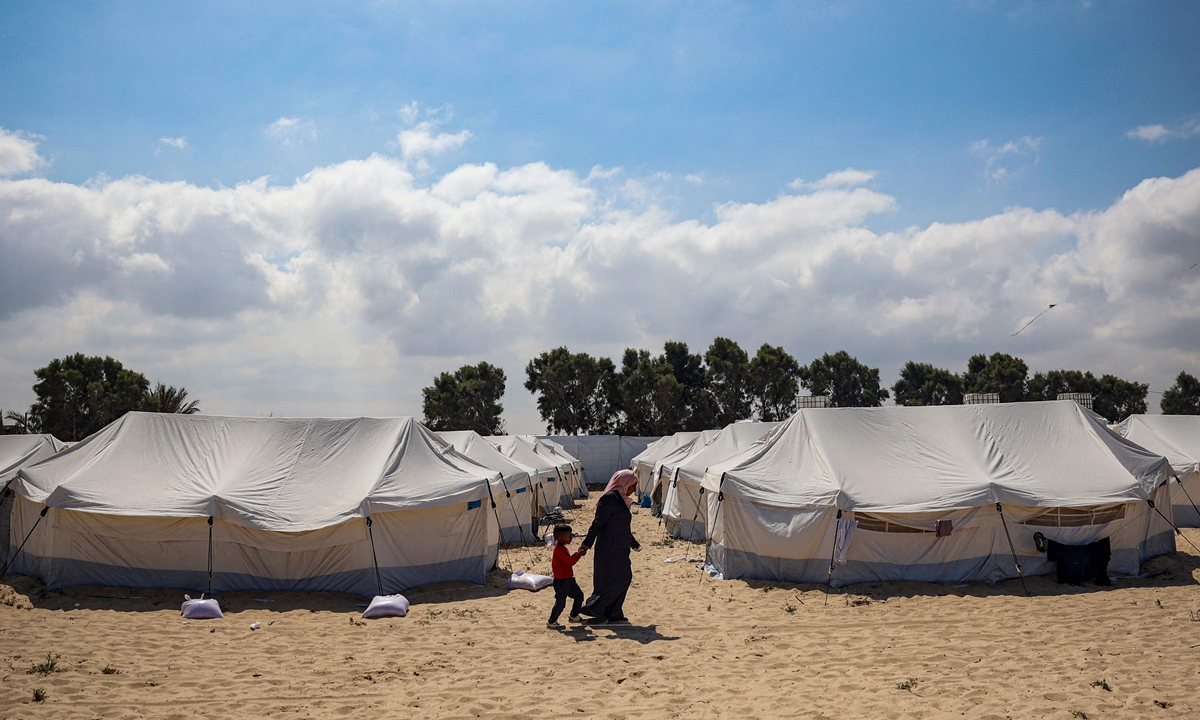
A woman and child walk past tents at a camp for displaced Palestinians in Rafah, in the southern Gaza Strip, on April 14, 2024. Photo: VCG
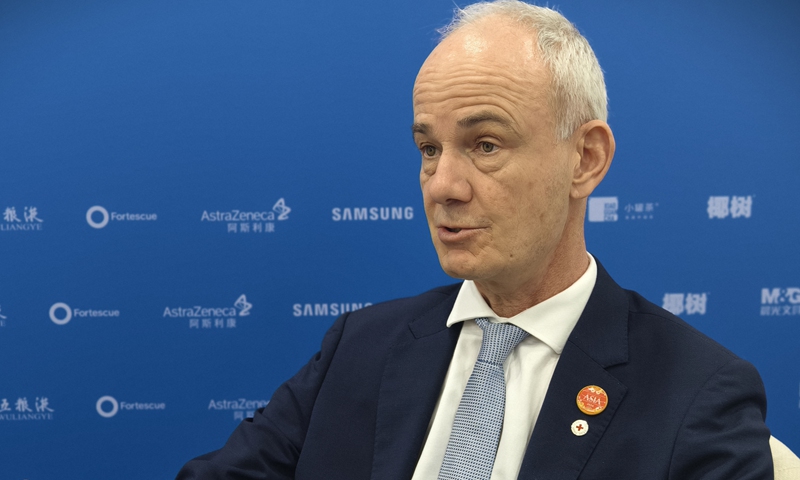
Gilles Carbonnier, vice-president of the International Committee of the Red Cross. Photo: Zhao Juecheng/Global Times
GT: What’s the work the ICRC has conducted in the Gaza Strip? What are the major challenges facing the ICRC?
Carbonnier: We reminded the parties to the conflict of their obligations under the Geneva Conventions and stressed the importance of adhering to international humanitarian laws. Next to that, we provide assistance in Gaza and we do our utmost to provide food assistance, especially at present. We have set up kitchens in the refugee camps in Gaza to provide food to the most vulnerable people. We also provide water through water tracking and support the water board and water utility in repairing wells, water pumping stations, and restoring water and wastewater treatment to prevent epidemics. Finally, we support hospitals and medical centers with drugs and medicines among others in Gaza.
The first issue, which we have mentioned again and again, is that it is key to reduce civilian losses and civilian suffering by abiding by and respecting international humanitarian law. Under international humanitarian law, civilians and essential goods and services must be protected. Another priority for us is to bring enough support to help avert major health issues, so that people can access healthcare, injured individuals can be treated, and epidemics can be averted, ensuring sick people have access to medical assistance.
However, there is a challenge as most of the health system in Gaza is not functioning or has been impaired, making it difficult to bring drugs into Gaza and distribute them to the different health centers that are still operational due to security concerns and logistical hurdles.
Food security is also a major concern. Currently, it is a struggle to bring enough food into Gaza, and the production of vegetables, poultry, and other food items has been partially destroyed.
We welcome the repeated support of China for the respect of the Geneva Conventions and international humanitarian law. We also welcome China’s support to help provide life-saving assistance, including medicines and other life-saving assistance in Gaza for those most in need. China has a very important role to play, all the way from being a member of the UN Security Council down to the provision of and support for medical assistance.
GT: How do you see the ongoing conflicts affecting the world? And personally do you think there is any solution to these conflicts?
Carbonnier: First, conflicts are becoming increasingly protracted, spanning generations. It is clear that there are no humanitarian solutions to these crises, only political ones. Therefore, we must identify the necessary political steps toward conflict resolution. However, peace and security are becoming more elusive as finding a solution becomes increasingly difficult.
Interestingly, the initial steps often involve humanitarian efforts, such as attempting to establish a humanitarian cease-fire. The ICRC serves as a neutral intermediary, able to communicate with all parties involved. It is crucial to maintain this space for neutral and impartial humanitarian actors like the ICRC, as they can facilitate dialogue with various parties in conflicts.
Sometimes the parties agree that they want to start a discussion between themselves and they ask us as a neutral intermediary to ensure the safe passage of, for instance, one party to the conflict, to be able to go to a place where they can meet and discuss. We provide this neutral intermediation. Sometimes this neutral intermediation that we do is the first step that provides an enabling environment for peace conversations.
The problem nowadays is that we see a lot of attacks against neutral humanitarian actors. Some people say, if you are not with us, you are against us. We say we are not against anyone, but we have to maintain a neutral role. And we will not publicly denounce this party to the conflict or that party to the conflict because if we publicly denounce different parties to the conflict every day, then we would be kicked out. And the international community would be left without a neutral intermediary on the ground. It is in the interest of major powers and the international community to preserve that space.
GT: Could you introduce some of the major cooperation between China and the ICRC?
Carbonnier: We have been present in China and have been cooperating with key stakeholders in China for many years. I believe we want to take this cooperation to a new level following the discussions and visit that President of the ICRC Mirjana Spoljaric had in September, 2023.
I believe that we can further our cooperation by engaging with the People’s Liberation Army (PLA) and the Chinese government on international humanitarian law, as well as by working more practically with Chinese foreign aid, particularly in the medical sector.
We had conversations with the National Health Commission recently. We also had a meeting with the China medical teams which have been sent to African countries. We engaged with them to share our expertise and experiences in the humanitarian sector. We have also started conversations with the China International Development Cooperation Agency to explore opportunities for better cooperation in the future. We welcome Chinese humanitarian workers who are interested in working with us. We are currently working closely with the Red Cross Society of China.
What I see and am really glad about is that our own delegations, present in about 100 situations of conflict, engage with the Chinese embassies on the ground to have a dialogue on the humanitarian situation. This interaction is much more fluid now. We also have regular discussions with foreign affairs officials, where we can share our assessment of the situation in Africa and in approximately 60 countries along the Belt and Road Initiative (BRI) where we are active.
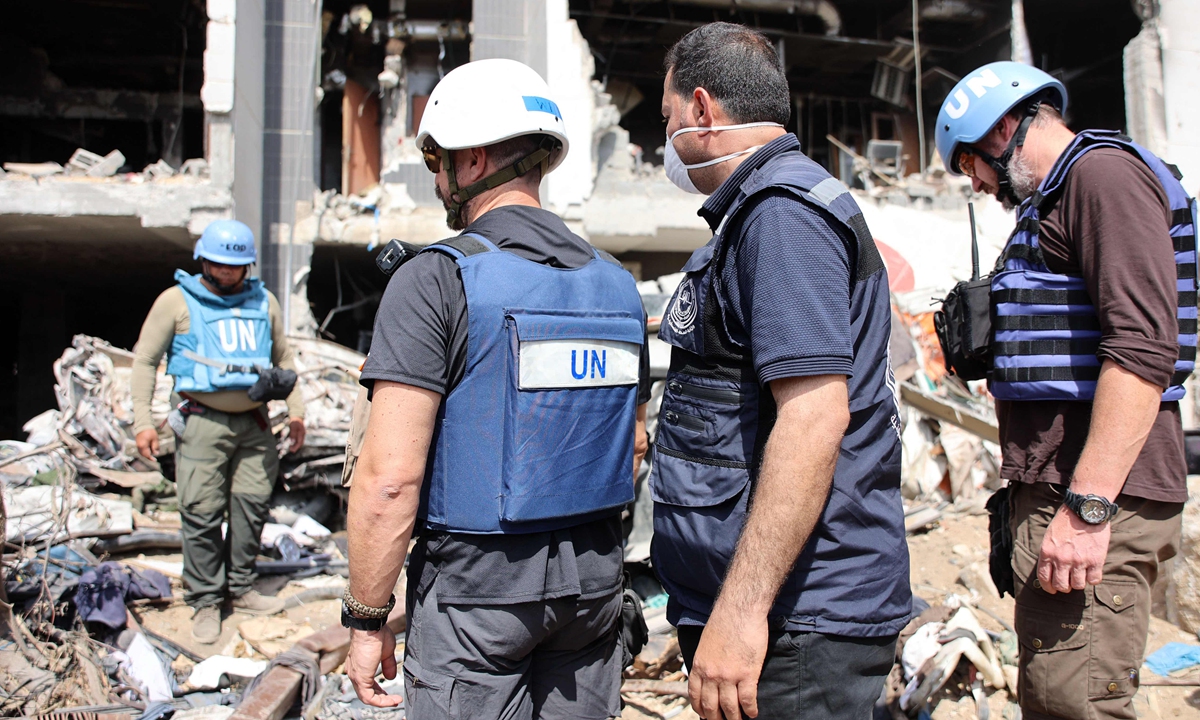
A United Nations team inspects the grounds of Al-Shifa hospital, Gaza’s largest hospital, on April 8, 2024. The hospital was reduced to ashes during a two-week Israeli raid. Photo: VCG
GT: What’s your take on the Global Security Initiative (GSI) and the Global Development Initiative (GDI)?
Carbonnier: I think with the GSI and the GDI provides clear guidance and perspectives that are of great interest to us. It also helps us to have a better understanding of foreign policy priorities for China.
Our understanding is indeed that China recognizes the interactions between security, development, and peace. I see common interests in that we work in protracted conflict situations. We aim to stop providing aid as soon as possible and instead provide sustainable humanitarian solutions. This includes providing people with seed capital and access to tools so they can generate income and regain dignity. We also aim to stop water trucking and repair wells and water pumping stations quickly so that major urban systems can function again, providing services to schools, hospitals, and other essential facilities.
I think we see an interaction between preserving development gains, even in conflict, and restoring them in order to provide people with opportunities as soon as possible. Once they have opportunities and income, the prospects for reconciliation and stability improve. The last point is that by promoting respect for international humanitarian law, we prevent the worst from happening. If we prevent the worst, people will reconcile more easily. If the worst has happened to your family, then hatred can pass from generation to generation.
The goal of the GSI and GDI is to preserve and promote sustainable development as a way to provide greater stability. In fragile situations, our efforts aim to restore livelihoods, preserve development gains, and prevent distractions and violations of international humanitarian law that could sow the seeds of further conflicts.
GT: I noticed that the ICRC is paying attention to the impact of AI in the military domain. What suggestions do you have to strengthen global governance cooperation on AI?
Carbonnier: For us, it’s important to recognize that in situations of armed conflict, the potential of AI is like a magnifying glass. It can save lives and achieve great things, but the risks are also heightened, as it can lead to tragic humanitarian consequences. Therefore, we believe it is crucial to harness scientific and technological advances to provide a more impactful and effective response.
Currently, humanitarian needs are increasing while funding is decreasing, making it necessary to find ways to be more effective. Utilizing digital transformation through technology is a key part of achieving this impact.
However, the use of AI, especially in weapons and machine learning, raises significant concerns. We have called for the regulation of autonomous weapon systems to address these concerns swiftly, as technological advancements are outpacing the government’s ability to regulate and govern these developments. We are worried that autonomous weapon systems powered by AI and machine learning could make life and death decisions without human control.
For us, it is critical to maintain human control over these decisions and human responsibility in accountability. We are also concerned about autonomous weapons, which have unpredictable consequences that even the designers and developers of the algorithm and products cannot anticipate. This is something that is unacceptable from an ethical standpoint, a legal standpoint, and a humanitarian standpoint. It is urgent. There are intergovernmental reflections on the global framework to govern AI at large, but also on the specificity of using AI in new warfare means and methods. This is a pressing issue that must be addressed by the international community.
GT: How do you view China’s role in gathering representatives from regional countries and international organizations to promote prosperity and economic development in Asia?
Carbonnier: It is important to recognize the critical importance of China in the region. China has been booming for many years and has greatly contributed to reducing overall poverty rates and addressing development issues. The region has seen significant progress in economic development, science and technology, and diplomacy. It is crucial to have opportunities like the Boao Forum for Asia to engage in diplomatic discussions with political leaders on fundamental issues such as development, security, and stability that have global implications.
I have been coming regularly to China. I hope to come back to Boao certainly in 2025 and the years after that.
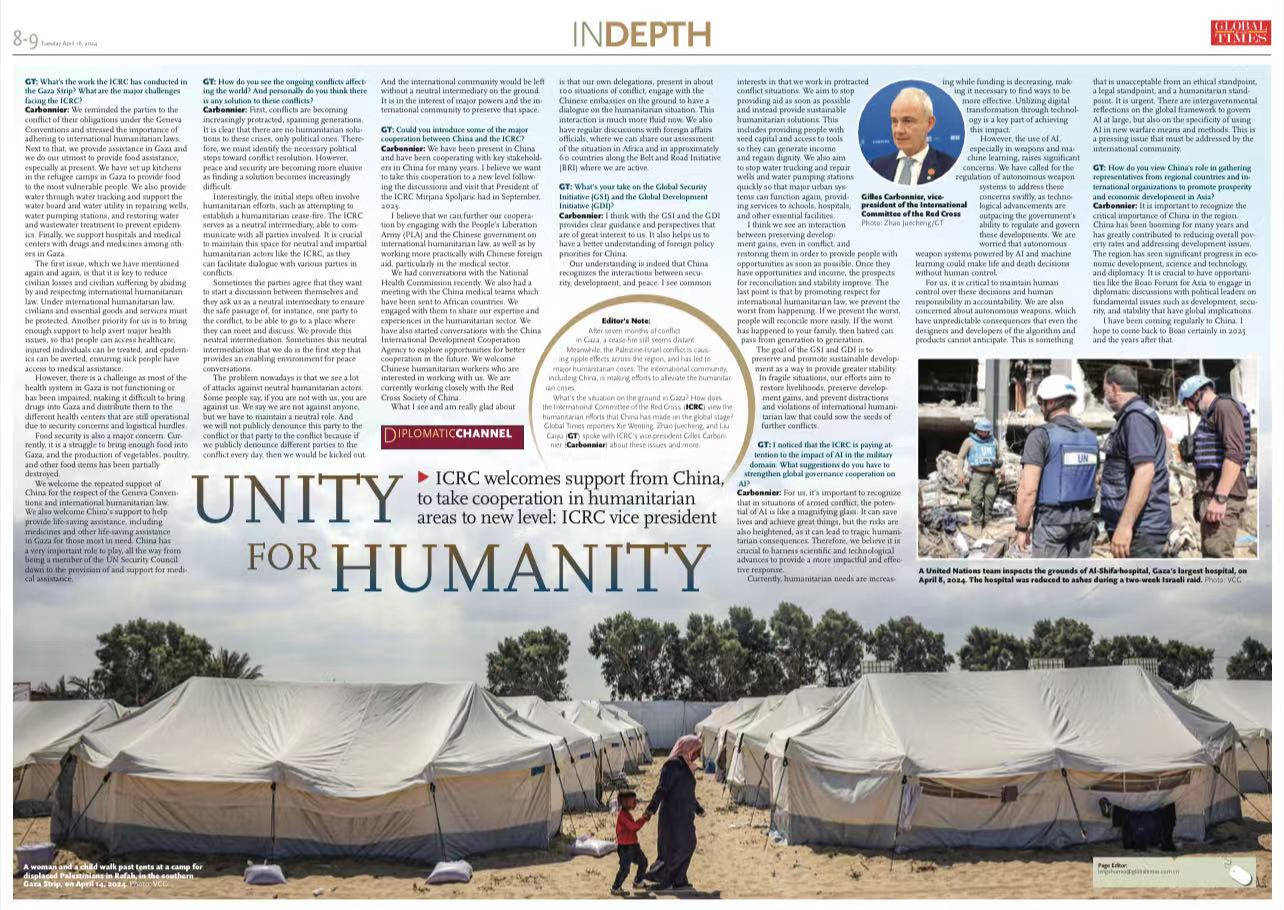
Unity for humanity
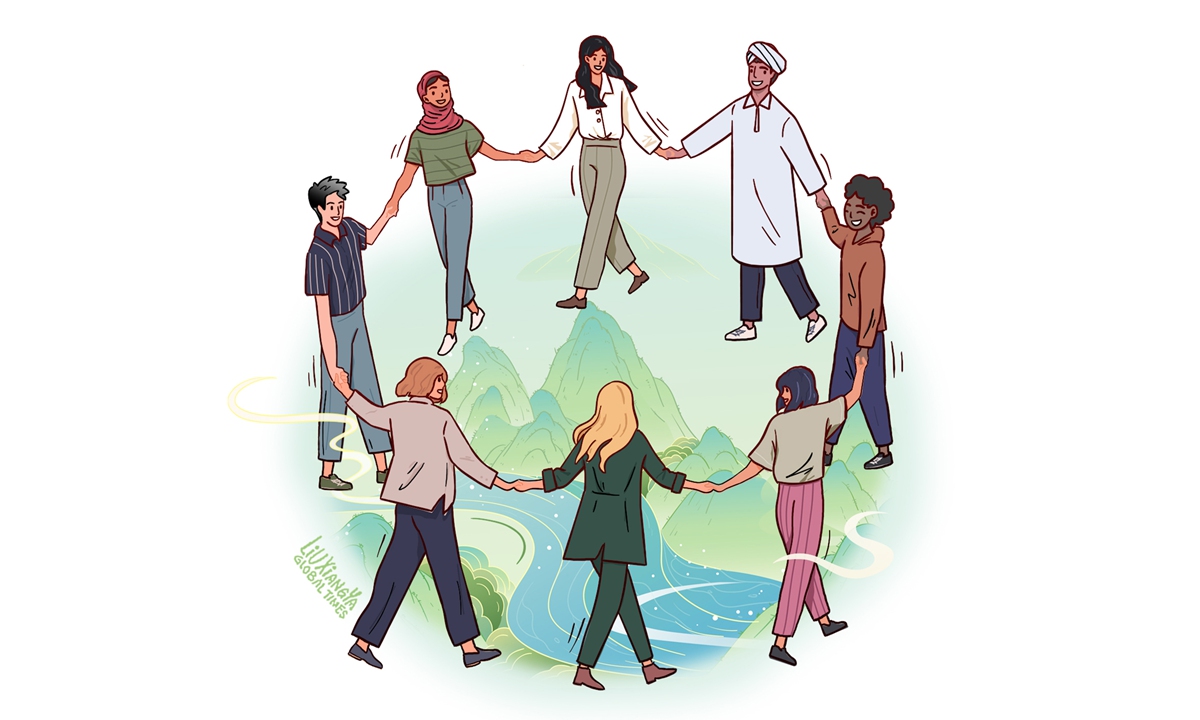
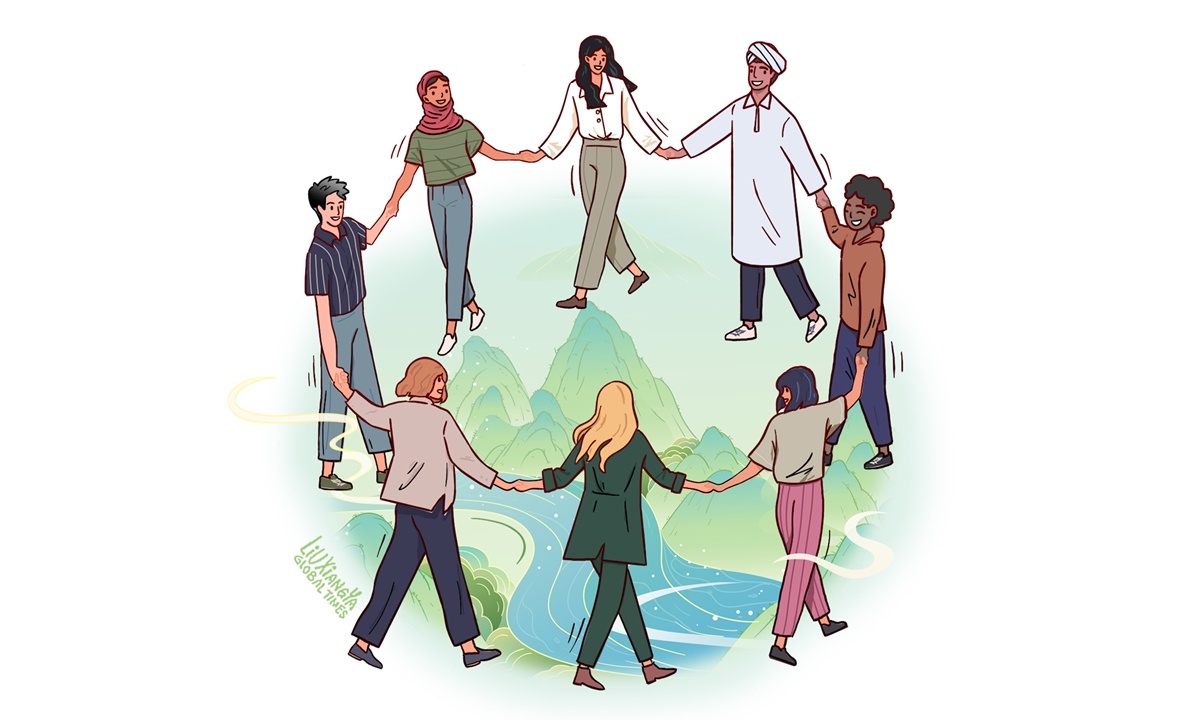
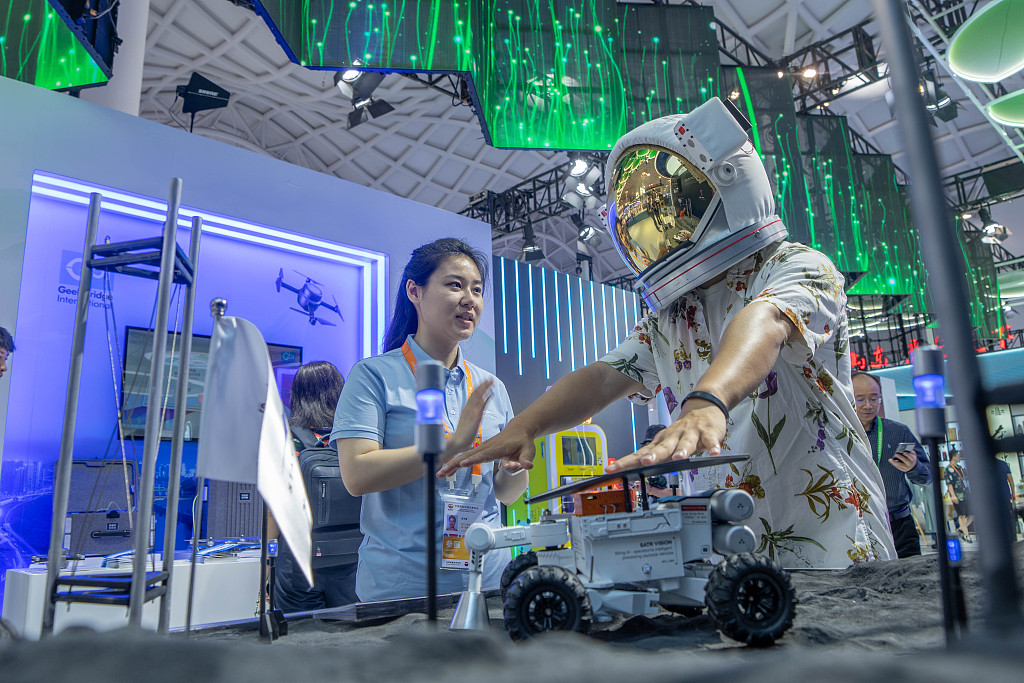
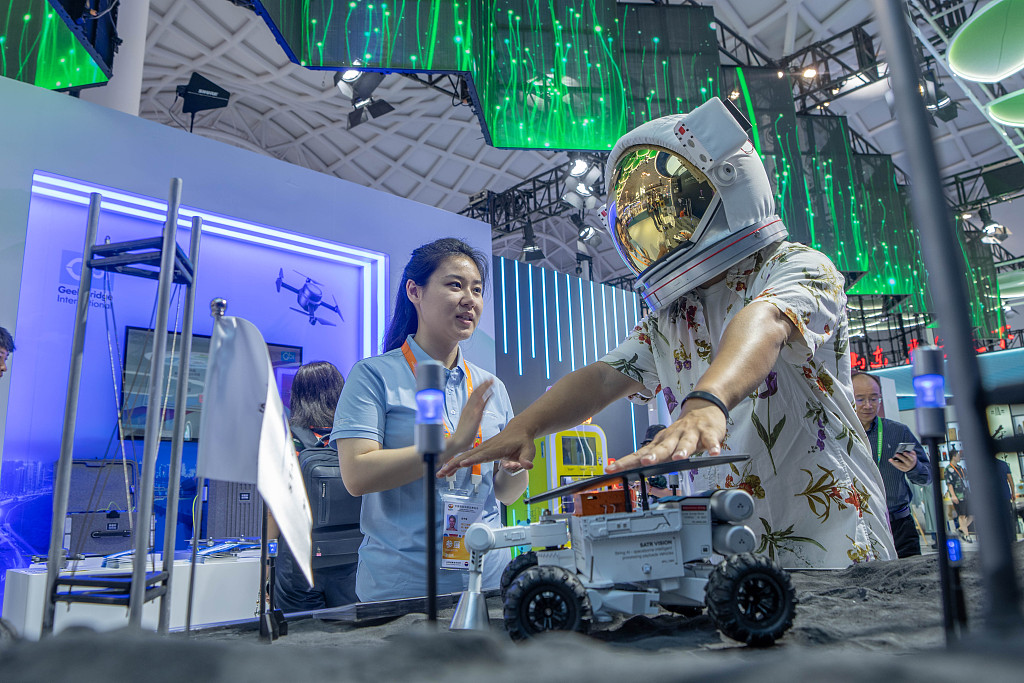 A visitor wearing a headset tries the satellite image service products at the fourth China International Consumer Products Expo in Haikou, South China’s Hainan province, on April 14, 2024. [Photo/VCG]
A visitor wearing a headset tries the satellite image service products at the fourth China International Consumer Products Expo in Haikou, South China’s Hainan province, on April 14, 2024. [Photo/VCG] 